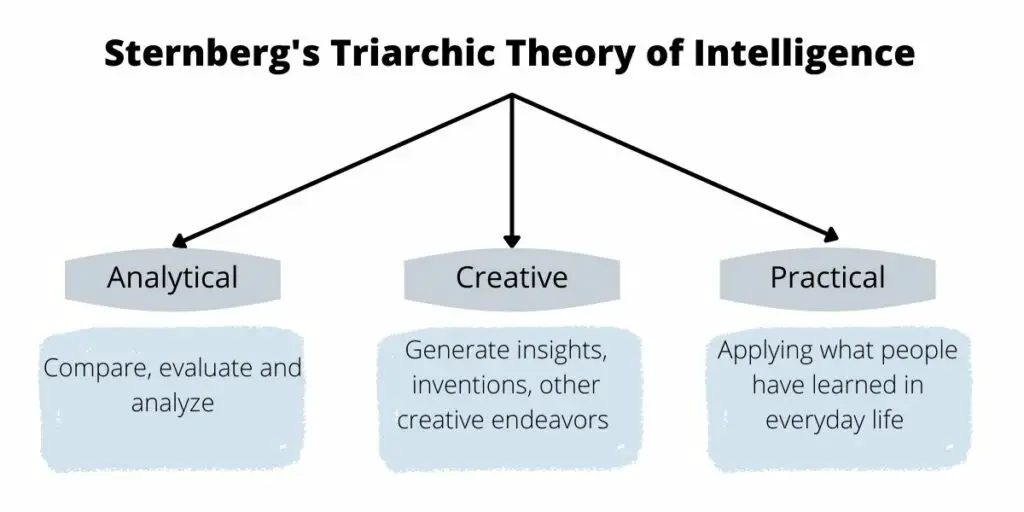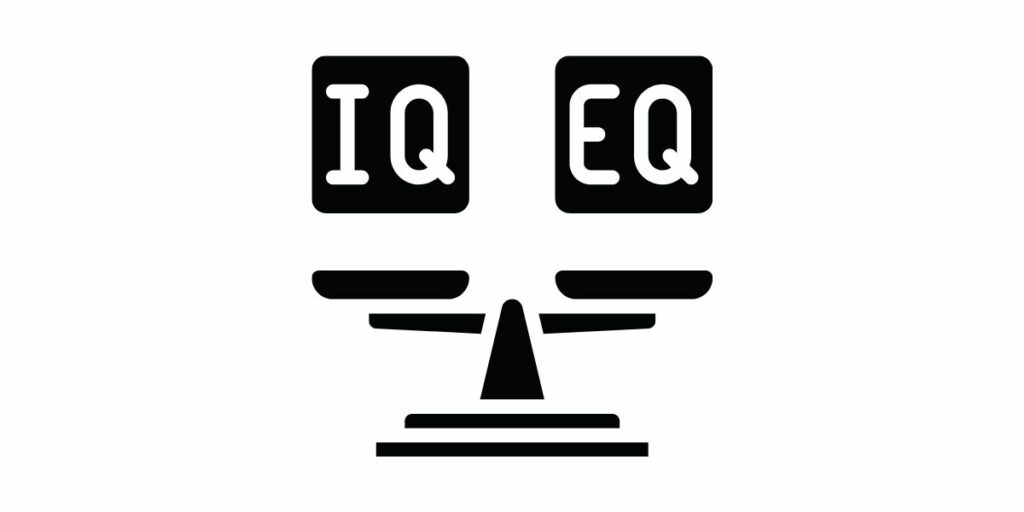Disclaimer: We sometimes use affiliate links in our content. For more information, visit our Disclaimer Page.
Robert Sternberg’s Triarchic Theory of Intelligence or Three Forms of Intelligence states that three types of mental processes are necessary for successful, intelligent behavior.
This theory has important implications for educators, as it suggests that intelligence is not a fixed trait but rather a set of skills that can be developed through instruction.
This blog post will look at Sternberg’s Triarchic Theory of Intelligence and explore its implications for teaching and learning.
What is Sternberg’s Triarchic Theory of Intelligence?

The Triarchic Theory of Intelligence, formulated by Robert Sternberg, is a cognitive-contextual theory that states three forms of intelligence: practical, creative, and analytical intelligence.
This theory goes against the traditional psychometric approach to intelligence, which only focuses on analytical intelligence. Instead, Sternberg believed that intelligence is more than just IQ scores and academic achievement; it also includes the ability to be creative and solve problems practically.
Who is Robert Sternberg?
Robert Sternberg is an American psychologist known for his love, intelligence, and creativity theories. He was born in New Jersey on December 8, 1949. Sternberg’s interest in psychology began early in life.
Sternberg is best known for his triangular theory of love, which states that there are three components to love: intimacy, passion, and commitment. He has also extensively researched intelligence and creativity, developing successful Intelligence theories.
Throughout his career, Sternberg has received numerous awards and honors. In 2006, he was named one of the most influential psychologists of the 20th century by the APA (American Psychological Association). He currently serves as a Professor of Psychology at Oklahoma State University.
What is Analytical Intelligence?

Analytical Intelligence is the ability to collect, process, and analyze information to draw conclusions or make decisions. This type of intelligence is often used in business, finance, and politics.
It requires both creative and logical thinking. For example, to be successful at analytical intelligence, one must see patterns and relationships between data points and then use that knowledge to make predictions or recommendations.
There are different types of analytical intelligence, each with its strengths and weaknesses. For example, some people may be better at identifying patterns, while others may be better at making decisions based on those patterns.
Analytical Intelligence is not a static skill; it can be improved with practice. As people become more familiar with the types of data and information they are working with, they will be better able to see patterns and relationships. Then, with experience, people can learn to make better decisions based on their analysis.
5 Benefits of Analytical Intelligence
Below are some of the top benefits of analytical intelligence:
1. Helps you understand data patterns
Analytical Intelligence helps you sift through large amounts of data to identify patterns and trends. This understanding can be helpful in everything from making better business decisions to improving your productivity.
2. Enables you to make better decisions
Once you have a good understanding of the data, you can use analytical intelligence to make better decisions. This could mean anything from choosing which products to stock in your store to deciding when to invest in a new company.
3. Helps you solve problems
You can quickly identify the root cause and then find a solution when you have analytical intelligence. This is incredibly useful in both personal and professional settings.
4. It gives you a competitive edge
If you have analytical intelligence and your competition doesn’t, you have a significant advantage. With the ability to quickly understand data and make good decisions, you can stay ahead of the curve and succeed.
5. It Makes you smarter
Finally, one of the best benefits of analytical intelligence is that it makes you smarter. By understanding data and solving problems, you learn new things and expand your knowledge. This can help you in all aspects of your life, from your career to personal relationships.
Analytical Intelligence is a valuable skill to have in today’s world. If you can harness it, you can use it to your advantage in many different areas of your life. So start honing your skills and reaping the benefits today.
What is Creative Intelligence?

Creative intelligence is the ability to think creatively and develop new ideas. It involves using your imagination and intuition to come up with solutions to problems or create something new.
Creative intelligence people tend to be good at lateral thinking, which is the ability to see connections between different things and come up with new ideas. They are also often good at problem-solving because they can think outside the box and develop alternative solutions.
This type of intelligence is essential in many different areas, such as business, science, art, and design. In addition, it can be used to develop new products, services, or ways of doing things.
Some famous examples of people who are believed to have been highly creative Intelligence are Leonardo da Vinci, Albert Einstein, and Steve Jobs.
Five benefits of Creative Intelligence
Below are some of the top benefits of creative intelligence:
1. Helps develop critical thinking skills:
Creative intelligence helps individuals develop critical thinking skills by encouraging them to think outside the box and see things from different perspectives. This type of thinking is essential in solving complex problems and making sound decisions.
2. Enhances problem-solving ability:
Another benefit of creative intelligence is enhancing an individual’s problem-solving ability. When faced with a problem, those with high levels of creative intelligence are more likely to develop innovative solutions.
3. Increases job satisfaction and productivity:
Individuals who are more creatively intelligent tend to be more satisfied with their jobs and are more productive than those who are less creative. This is because creative intelligence allows people to come up with new and innovative ideas, which can help them stand out from the competition.
4. Encourages risk-taking:
Creative intelligence encourages risk-taking, which is essential in achieving success. Taking risks allows individuals to try new things and explore new possibilities.
5. Boosts creativity:
Lastly, one of the critical benefits of creative intelligence is that it boosts creativity. Creativity is essential in solving problems, coming up with new ideas, and making progress in any field. Therefore, those with high levels of creative intelligence are more likely to succeed in whatever they do.
What is Practical Intelligence?

Practical intelligence is a term used to describe the ability to deal with everyday problems and situations. It is different from academic intelligence, which focuses on theoretical concepts and less on real-world applications.
This intelligence includes abilities such as street smarts, common sense, resourcefulness, and problem-solving skills. All these skills promote success in both personal and professional life.
There is some debate over whether practical intelligence can be measured or not. However, various tests and scales purport to do so. For example, the BarOn EQ-i test measures emotional intelligence, a type of practical intelligence.
Overall, practical intelligence is a valuable concept that describes essential skills. It is crucial for both individual and organizational success.
Related: Best way to develop your Practical Intelligence
5 Benefits of Practical Intelligence:
Below are some of the top benefits of practical intelligence:
1. Helps you understand people and situations better
Practical intelligence can help you better understand both people and situations. This can be extremely useful in personal and professional settings, as understanding others is key to building strong relationships and achieving success in many endeavors.
2. Helps you find creative solutions to problems
It can also help you find innovative solutions to problems. This can be helpful in both everyday life and work-related contexts. Developing creative solutions can make you more efficient and effective in whatever you do.
3. Helps you adapt to change
Change is a constant in life, and adapting to it is crucial for success. Those with practical intelligence are good at adapting, as they have the problem-solving skills and understanding of people and situations that allow them to do so.
4. Helps you stay organized
One of the critical aspects of practical intelligence is staying organized. This can be extremely helpful in both personal and professional contexts. Those with this type of intelligence are typically good at planning, organizing, and managing their time and resources.
5. Helps you achieve your goals
Finally, practical intelligence can help you achieve your goals because it allows you to see the world around you more clearly. With a better understanding of your environment, you can make better decisions about what actions to take to achieve your goals.
IQ vs. EQ: Which one is More Important?

It’s a common debate: which is more important, IQ or EQ? Which one gives you the more significant edge for success in life?
The answer may surprise you.
Studies have shown that while IQ (Intelligence Quotient) is important, EQ (Emotional Intelligence) strongly correlates with success. Emotional intelligence encompasses effectively managing emotions – both your own and others.
People with high emotional intelligence typically can regulate their emotions, set boundaries, and handle conflict constructively. They’re also better at empathizing with others and building relationships. Research has shown that emotional intelligence accounts for nearly 90% of what sets successful people apart from the rest.
So if you’re looking to achieve success in life, it’s essential to focus on developing your emotional intelligence. EQ can be improved with practice, so don’t be discouraged if you’re not born with a high EQ. Instead, start working on it today, and you’ll see the benefits in no time!
Related: Fluid and Crystallized Intelligence
What is Human Intelligence?
Human Intelligence is the capacity to reason, plan, solve problems, think abstractly, comprehend complex ideas, learn quickly from experience, and adapt to new situations. It is not a single ability but a combination of cognitive abilities and skills.
Intelligence is believed to be determined mainly by genetic factors, though it can also be affected by environmental factors such as nutrition, quality of education, and exposure to stimulating experiences. A definition of intelligence that has been widely accepted is “the ability to learn from experience and adapt to one’s environment.”
The study of human intelligence is known as psychometrics. Psychologists use a variety of tests and methods to measure intelligence. The most commonly used measure of intelligence is the IQ (intelligence quotient) test, which measures a person’s ability to reason, problem-solve, and think abstractly.
Related: Intrapersonal Intelligence
What are the three components of Analytical Intelligence?
Analytical Intelligence, also known as academic problem-solving skills, consists of mental, performance, and knowledge acquisition components.
Metal components involve the ability to think abstractly and see relationships between concepts. Performance components include the ability to use the information to solve problems. Finally, knowledge acquisition components the ability to learn new information and integrate it into existing knowledge.
These three components work together to allow individuals to solve problems effectively. For example, individuals who are strong in analytical intelligence can often identify patterns and make connections that others may not see. This allows them to see solutions that others may not be able to find.
If you want to improve your analytical intelligence, you can do a few things. First, try to expose yourself to new and challenging information. This will help you develop your metal component skills.
Second, practice using the information to solve problems. This will help you develop your performance component skills. Finally, make an effort to learn new things and integrate them into your existing knowledge base. This will help you build your knowledge acquisition component skills.
Developing all three of these components can become a more effective problem solver.
What are the critical implications for educators?
Sternberg’s theory has important implications for educators. First, it suggests that intelligence is not a fixed trait. This means that people can develop their intelligence through instruction.
Second, Sternberg’s theory implies that intelligence is not just about logic and reasoning. Instead, it’s about the ability to find creative solutions to problems and apply knowledge in practical ways.
If you’re a teacher, you can use Sternberg’s Triarchic Theory of Intelligence to help your students develop their intelligence. For example, you can provide opportunities for students to practice analytical skills by having them solve problems in class. This approach to intelligence has helped teachers understand how to teach the full range of intellectual abilities.
You can also encourage students to be creative by having them brainstorm new ideas or come up with innovative solutions to problems. Finally, you can also help students develop their practical intelligence by giving them real-world tasks to complete or providing opportunities to apply their knowledge in authentic situations.
Final Thoughts
Sternberg’s Triarchic Theory of Intelligence is a comprehensive framework for understanding human intelligence. It consists of analytical Intelligence, emotional intelligence, and practical Intelligence. These components contribute to a person’s ability to reason, solve problems, and think abstractly.
While all three components are important, research has shown that Emotional Intelligence is the most critical factor in predicting success. Therefore, if you want to achieve success in life, it’s essential to focus on developing your emotional intelligence. With practice, anyone can improve their EQ and reap its benefits.
FAQs
What is Fluid intelligence?
Fluid intelligence encompasses the ability to think abstractly and solve problems. This ability is considered independent of learning, experience, or education. This intelligence is often contrasted with crystallized intelligence.
Crystallized intelligence accumulates knowledge and skills acquired through experience and education. While fluid intelligence declines with age, crystallized intelligence usually increase.
What is exceptional intelligence?
This question has been asked throughout history, but there is no clear answer. Some people believe that it is a gift from God, while others think that it is something that can be learned. However, one thing is for sure – exceptional intelligence is rare.
There are many different types of intelligence, and it isn’t easy to define this intelligence in general. However, some people might consider exceptionally intelligent individuals to be those who can think outside the box, come up with innovative ideas, and solve complex problems. They may also have an excellent memory and be able to learn quickly.
What is Cultural Intelligence?
Cultural intelligence (CQ) is the ability to function effectively in a culturally diverse environment. It’s the capacity to span boundaries and thrive in various cultures. CQ has been linked to career success, especially for individuals who work in multinational corporations.
What is Multiple Intelligences Theory?
Gardner’s Theory of Multiple Intelligences is a theory that suggests that there are different types of intelligence and that each person has a unique combination of this intelligence. Gardner identified different types of intelligence, including linguistic, logical-mathematical, spatial, musical, interpersonal, intrapersonal, and naturalistic.
Dr. Howard Gardner first advanced his idea in his 1983 book Frames of Mind: The Theory of Multiple Intelligences, which stated that all humans have diverse sorts of intelligence.
What is Charles Spearman’s general intelligence?
Charles Spearman’s general intelligence, also known as the g factor, is a mental ability that he said underlies multiple specific skills. These include verbal, spatial, numerical, and mechanical skills. The g factor is thought to measure a person’s general cognitive ability and is often used as a predictor of success in various areas, including education and employment.
Some experts have criticized the use of the g factor, arguing that it does not accurately reflect the complexities of human cognition. However, it remains a popular concept in psychology and continues to be widely used in research. Furthermore, ancient philosophers, such as Aristotle, subscribed to a similar opinion long before modern psychology developed.





